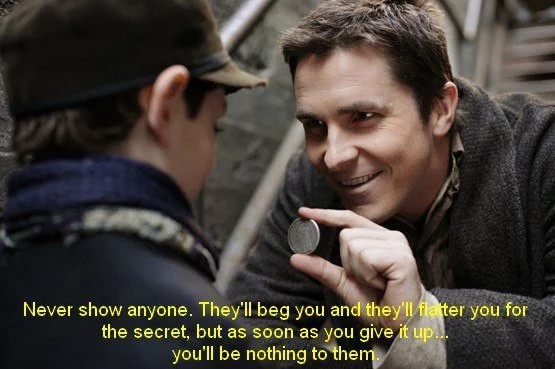The Magic of Troubleshooting
I have been fascinated by performance magic for a long time. The showmanship, the misdirection, the psychology behind the scenes that makes the trick “work”, I enjoy it from multiple angles. I’ve found many of the principles magicians use to be applicable to other areas of life, especially appliance repair.
I know, I know, it sounds like a stretch, but give me a second to explain. In the Christopher Nolan movie, “The Prestige”, we see a magician played by Christian Bale teaches a boy a trick using a double sided coin. He impresses one lesson upon the boy, “Never show anyone. They’ll beg you and they’ll flatter you for the secret, but as soon as you give it up... you’ll be nothing to them.”
How does an appliance repair tech like myself hear that? It’s my job to walk up to a mysterious box in your house, figure out the secret behind the malfunction, and fix it. BUT, I am a bad technician with poor communication skills if I DON’T give away the secret to my customer.
I have seen it again and again, after some amount of effort and thought I present my diagnosis to the customer so they can make an informed decision to pursue a repair or not, and now some of the magic is gone. “Oh, it was just a bad motor? That makes sense.”, “A door latch, yeah, I figured as much.” It’s as if the diagnosis they see is the only possible way it could have gone, but that is rarely true! There are always multiple potential causes for the issue the customer is experiencing, and it’s my job to figure it out. I get to enjoy the mystery, collapsing the many possibilities down to just one. The trick is in the knowledge base I have built up about specific appliances coupled with deductive reasoning, producing theories that are then proven or disproven each step of the way.
Lets say I visit a customer, they say their dishwasher isn’t getting any water. I ask why they think that while I start a wash cycle. They say their dishes come out just as dirty and not the least bit wet, but as they are speaking I hear the quiet water valve come on and can hear the soft tinkle of water entering the machine. I remove the kickplate, hold my non-contact voltage tester up against the wires going to the wash motor. As soon as it beeps, I try tapping on the wash motor with a screwdriver. Suddenly, the dishwasher that was reportedly receiving no water fires up with a familar “WOOSH” of water hitting the dishes and the door. “What did you do?!” Asks the customer.
Now, do I take Christian Bale’s advice and refrain from explaining the trick? Of course not. It’s not my job to perform a trick, it’s my job to help the customer make an informed decision. I must explain my reasoning, why I did what I did, and finally what it means, especially regarding the bottom line. The seized motor I tapped needs replacing, and they must decide if it’s worth it to them.
I take pride in doing my job well, and there are multiple facets to consider, primarily who I am serving with my skills. I know it is essential and valuable to explain how I reached my conclusions when a diagnosis is complete but I must admit just a little bit of a wish to hang on to the mystery. “How did you do that?!”
“Magic”


